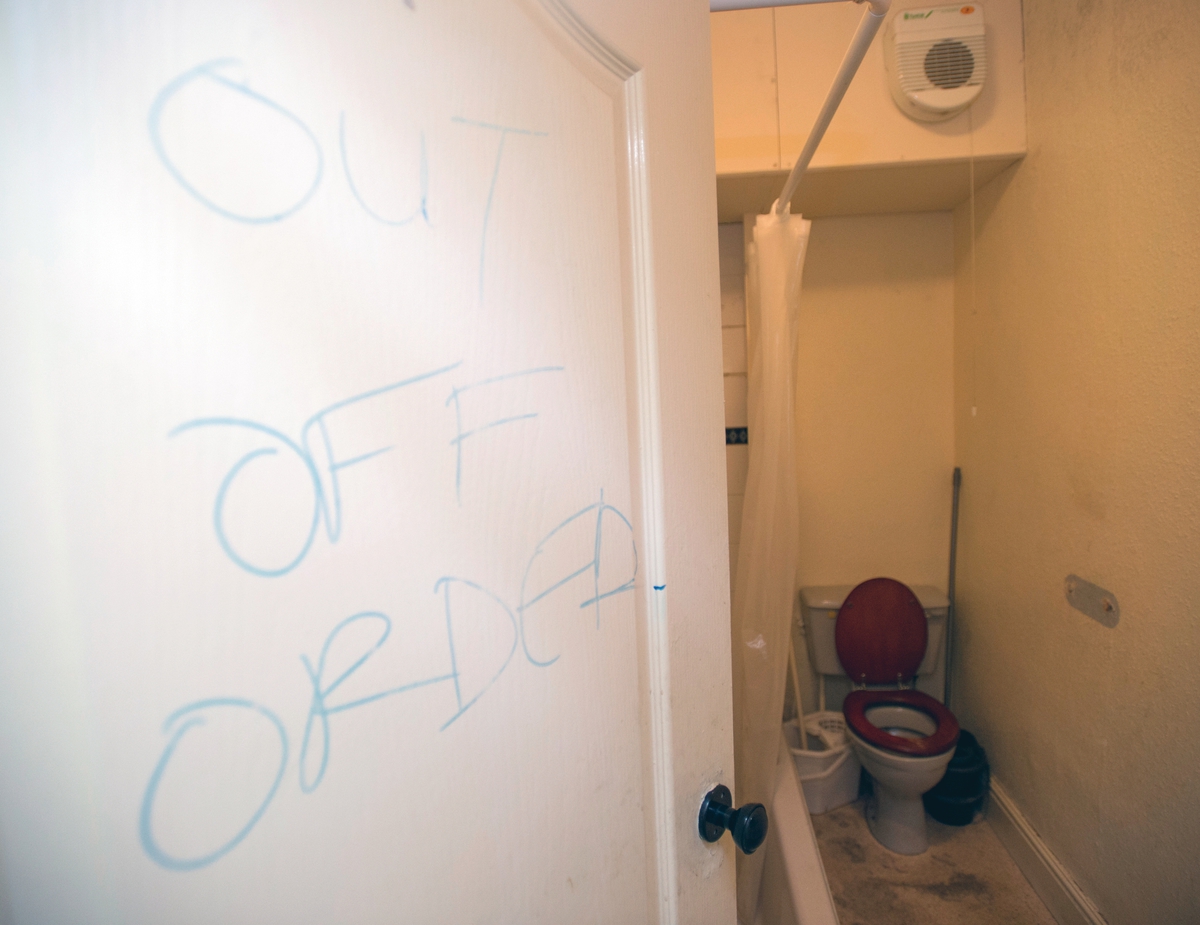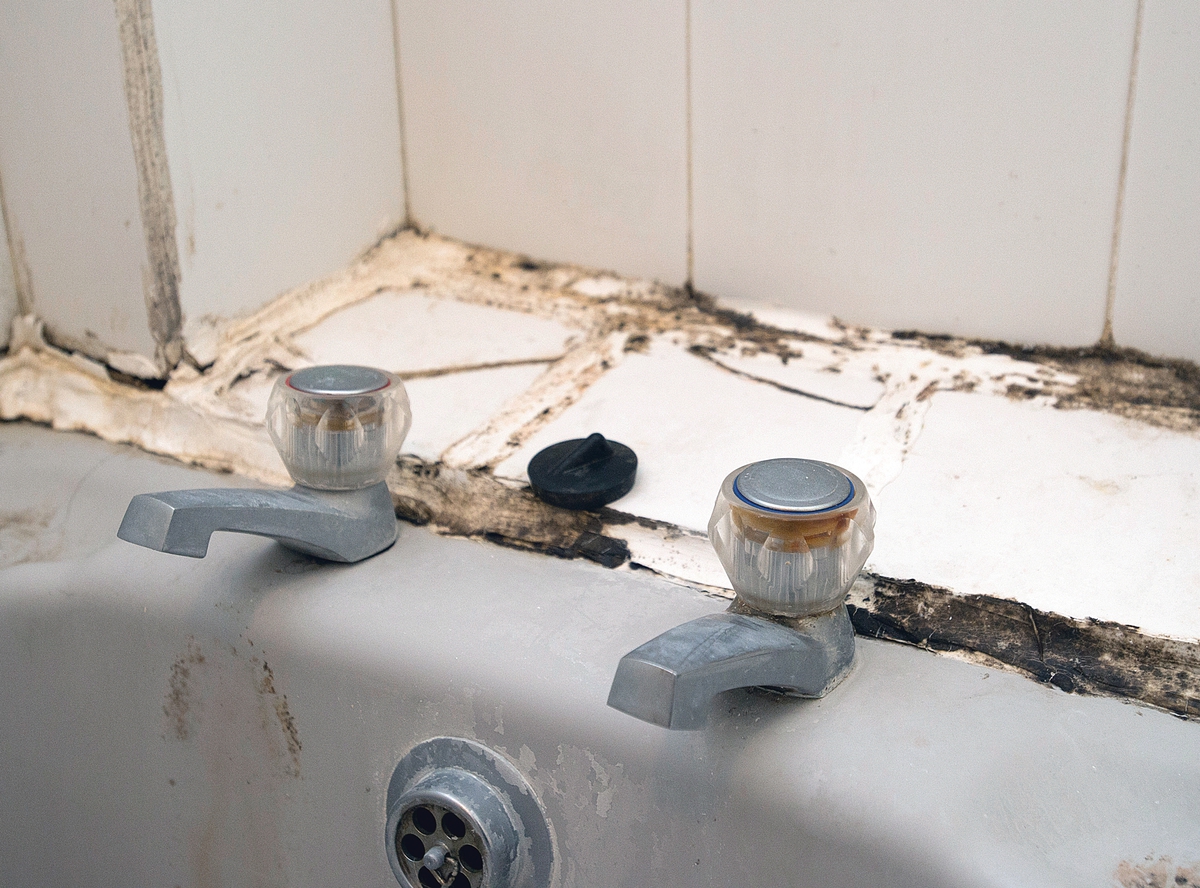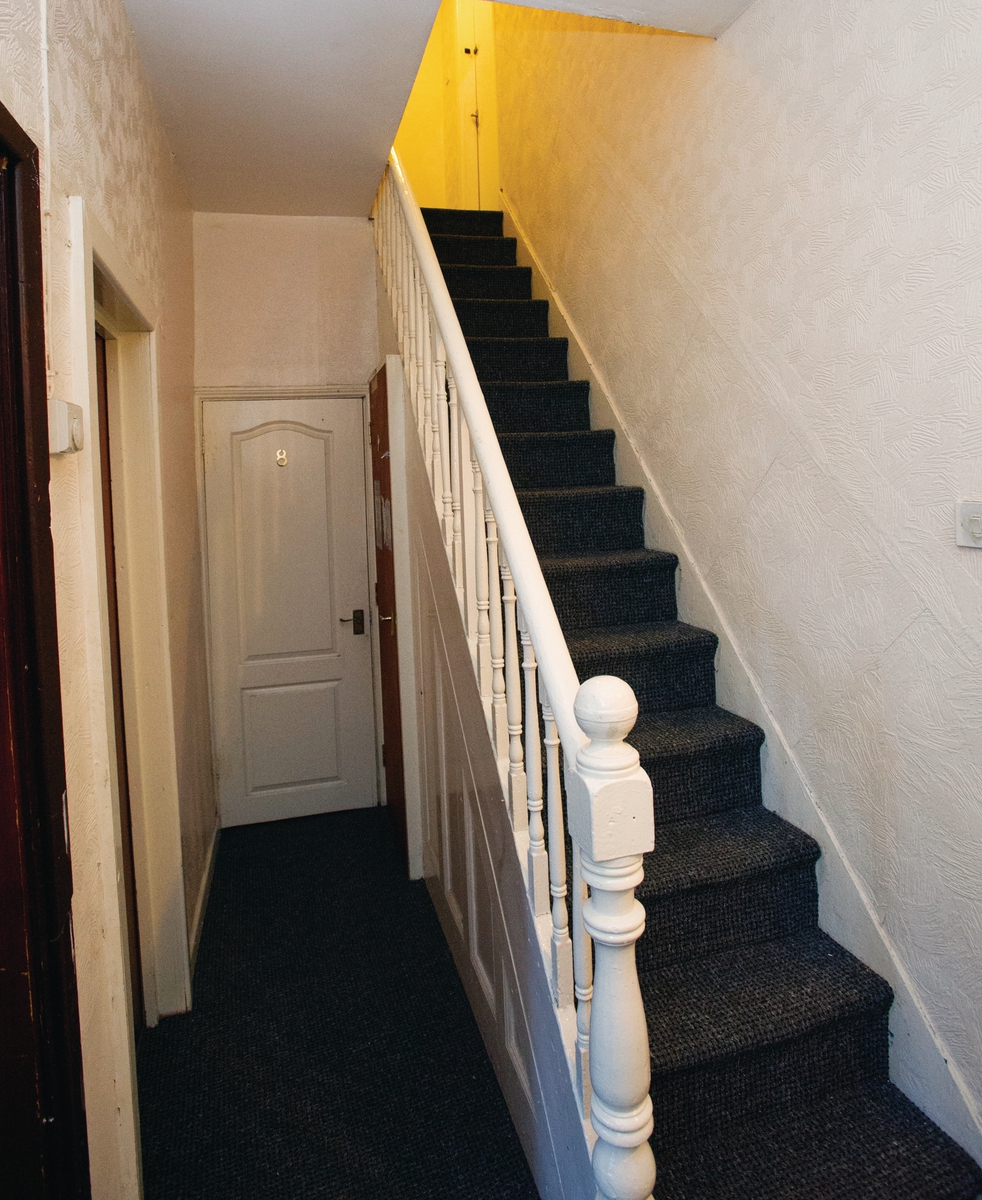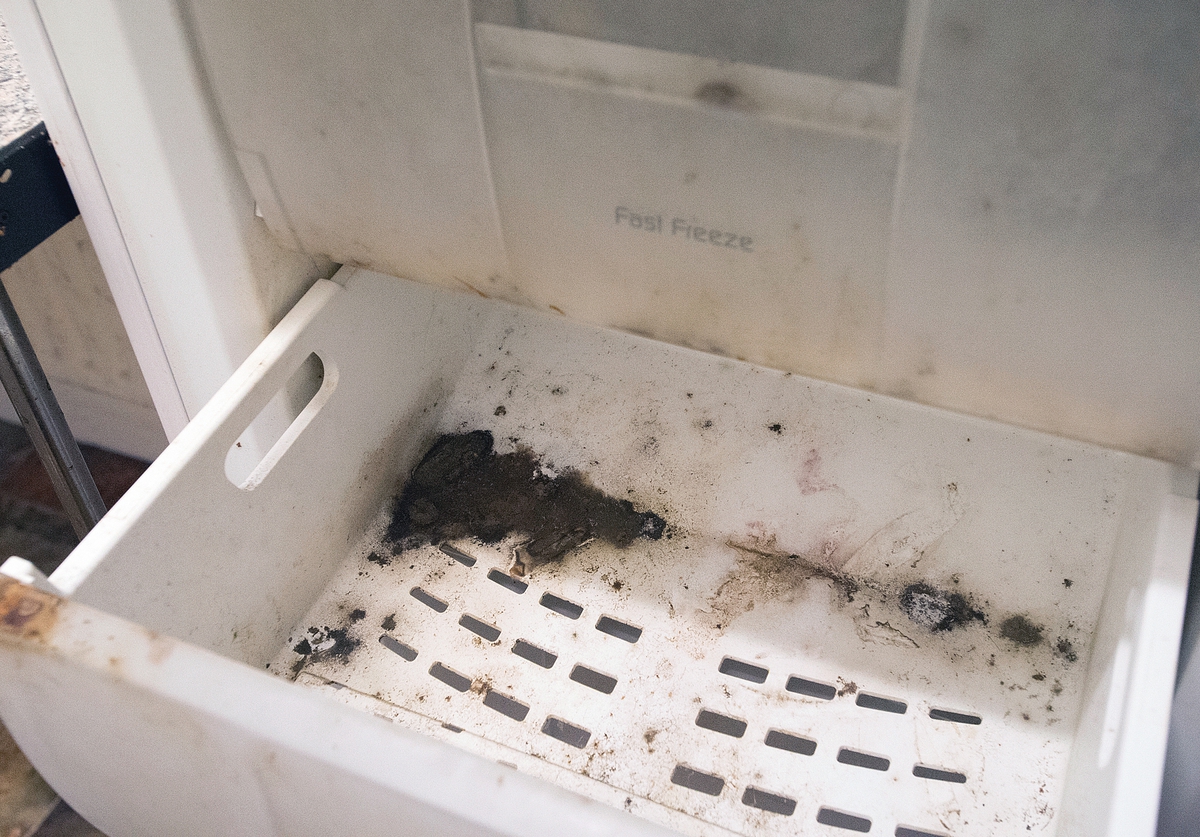Taking over the asylum
A man in a wheelchair is allocated a house where the one working bathroom is upstairs, while a woman is so tired of being fobbed off, she threatens to take her own life. Emily Twinch investigates the standard of service received by asylum seekers housed in the north of England
Fatima* breaks down in tears as she talks about the number of times she has called her landlord to sort out problems with her property.
‘I called them a hundred times and I get nothing. I am really tired,’ she says. ‘I told them I would kill myself.’
It took about three weeks to get heating, Fatima says. When she first moved in, a broken internal door meant people walking past could see straight into her bedroom. The door took a similar amount of time to fix, she adds.
While these problems have been sorted when we visit Fatima’s home in Sheffield in November - about six weeks after she moved in - Fatima still has clothes drawers that are falling apart and no door on the food cupboard in the lounge/kitchen of her small one-bedroom flat.

The 12 men have been left with just one working toilet
She points out she must pay for every phone call to her landlord and, as an asylum seeker with an income of £36.62 per week on section 95 support from the UK Border Agency, it is money she could do without spending.
Fatima has moved into a property run by a sub-contractor of security giant G4S, which was awarded the contract for housing 3,816 asylum seekers in the Yorkshire and Humberside region in March. She says the standard of housing and service she receives is much worse than that provided by previous landlord, Sheffield Council.
‘[The council] were the best people I have [met] in the UK. They asked us what we needed all the time. When they visited me they wrote a letter or called me [in advance].’ Her current landlord, she says, either does not turn up when she has a problem - or does so unannounced.
G4S runs a 24-hours-a-day, freephone number, but calls are not free for mobile phones. Although G4S’s asylum accommodation director Andrew Gray says the company is ‘happy to phone [tenants] back’.
The firm won the UKBA contracts under the government’s commercial and operational managers procuring asylum support services project - aimed at saving public money - for the midlands, east and north east of England. The six COMPASS national contracts are together worth £620 million and are expected to save the government £150 million over their six-year life.
Not enough properties
In Yorkshire and Humberside, G4S needed to move 1,468 of the 3,816 asylum seekers out of council-owned housing and into private rented sector properties. Local authorities in the area say the firm has struggled to find high enough quality accommodation in the right areas at the right prices.
It missed the initial deadline of 12 November to move all of them. At this point, Kirklees, Leeds and Barnsley councils were housing the majority of 339 asylum seekers still living in local authority properties. G4S renegotiated the deadline for the 7 December, which it managed to hit four days early.
A spokesperson for G4S says that ‘the welfare of the people we look after is our top priority’.

A sink in Kasun’s* house
But charities and campaigners who work with asylum seekers in Yorkshire and Humberside beg to differ. They say their fears that G4S will push people into poor-quality housing or homes that are not ready for use, have
been borne out.
Inside Housing travelled to south Yorkshire in a bid to meet asylum seekers like Fatima who have been rehoused by G4S and to see if their complaints about their living conditions are justified. We wanted to find out whether G4S is delivering the service demanded of it under the terms of its contract with UKBA.
In a second property in Sheffield, we find 12 men living in a six-bedroom house - two to a room. Kasun* has been living here since September. He says when he tries to call G4S about a broken toilet and light in the shower room, no one picks up the phone. When he has been able to get through, he has been assured someone will come out to the house, but no one turns up.
A representative from the landlord came to the house about three or four weeks ago, Kasun says, yet the light he asked them to fix is still broken when we visit.
A spokesperson for G4S admits there ‘have been issues with the service centre but these have been resolved’.
Appalling conditions
The 12 men share one upstairs toilet, as the second one downstairs is broken. The mould that was in one of the two fridges when they moved in has continued to grow, while the other is prone to breaking down. The railings on a flight of narrow stairs going up to the third floor of the house come away from the wall as you grab onto them. The lino in the bathroom has stains which look like mould and the kitchen walls are splattered with flecks of fat that appears to have been welded on for some time.
Kasun says when they moved in the place was filthy and they had to clean it themselves. ‘This is not a home,’ he says. ‘This is jail.’ When asked why he doesn’t complain he voices many asylum seekers’ fear - deportation. ‘I can’t complain. G4S and UKBA are more powerful than me. They can deport me,’ he says.
Around seven miles away in Rotherham, Ashan* shows us the sparse, grubby four-bedroom property he has been allocated. He was hit by a van in August and badly fractured his ankle, which left him in a wheelchair. He asked to be placed close to shops, but was put in a house on a hill about a mile from the nearest food stores. The only bathroom is upstairs and his bedroom is downstairs. He claims G4S sub-contractor Live Management told him he could crawl up to the bathroom. Live Management deferred the response to G4S.

One of the two fridges
G4S said: ‘We would find this hard to believe but cannot investigate further without full details.’ Inside Housing could not identify the man to G4S as he spoke to us on condition he remained anonymous. Ashan had progressed to crutches when we visited, but says he still finds it difficult to hobble to the shops and get up the stairs.
Dilan*, who lives in Sheffield, talks about moving into a property covered in dust with rubble dumped in the garden. G4S has done some work on the property, but didn’t manage to clean up before he arrived.
‘This is work G4S should have done before he moved in,’ his National Refugee Council advisor adds as she speaks to Dilan at a weekly advisory drop-in for asylum seekers in the area.
In a letter replying to a story run by The Independent on the G4S properties in Yorkshire and Humberside, G4S group’s managing director, David Morgan, demonstrates why this could be important, stating: ‘All our properties must be contractually compliant before people are allowed to move in.’
The UKBA does give details of the requirements under its COMPASS contract on its website, to ensure homes are ‘safe, habitable, fit for purpose and correctly equipped’. The UKBA told Inside Housing it was not aware of any complaints about G4S properties.
But advisors and volunteers from the Northern Refugee Centre and campaign group South Yorkshire Migration and Asylum Action Group say people have come to them with complaints - until about two weeks ago the Northern Refugee Centre was receiving about five per day. The groups do say, however, that complaints have now tapered off.
Infested with insects
Following the discovery of a woman and her five-month-old baby reportedly being housed in a property infested with cockroaches and slugs, Leeds Council announced G4S had agreed to undertake a review of its property portfolio. Representatives from the local authority visited the property in question on 10 December and found it ‘was not suitable for the tenant or anyone else to be living there in its current condition’. G4S has since rehoused the woman and her baby.

The stairs Ashan* was told to ‘crawl up’ in his Rotherham home
Peter Gruen, executive board member for neighbourhoods, planning and support services at Leeds Council, confirms ‘property standards are clearly an issue with the portfolio of properties being used in Leeds under this contract; and G4S have undertaken to review the portfolio’.
Under review
In fact, G4S has committed to reviewing all its properties, including those it took on from other landlords and those it acquired itself.
‘We have got to improve the quality of accommodation,’ G4S’s asylum accommodation director Mr Gray admits. ‘We wanted to ensure we complied with the transition [deadline], but ensure any of the properties we have taken on… are improved straight away.’ G4S inspects all its properties every month, he adds.
Mr Gruen urges the UKBA to ‘pro-actively manage the contract standards to ensure all homes meet the contractual standards prior to use, put a managed timescale on the review of all properties and ensure the support provided to asylum seekers is monitored and measured’.
Jim Steinke, chief executive of the Northern Refugee Centre, adds: ‘We need to recognise that although the service provided through the contract with G4S is so problematic, it is a symptom of a flawed process for tendering that has resulted in such a bad outcome.’
A spokesperson for UKBA says if it is unhappy with the quality of G4S’s service, money can be deducted from its monthly payment. Performance indicators will determine how much this reduction will be.
The spokesperson said: ‘Contracts for asylum services have been awarded to providers that demonstrated that they could meet our high standards of support and ensure the welfare of individuals.’
It does appear G4S is now improving its stock. A G4S spokesperson promises ‘where there are problems, we want to know about them, so that together with our accommodation partners, we can put them right’.
While G4S is making all the right noises and appears to be fixing problems after people have moved into properties, concerns about its performance remain among charities working with asylum seekers. The suspicion lingers that G4S may have been over-confident about what it could do in a particular timescale within its budget. It must now put that right. As Mr Steinke says: ‘As a mark of a civilised society we need to ensure asylum seekers are treated with basic housing rights and live in fit accommodation.’
*names have been changed to protect identities
What the contract requires
The commercial and operational managers procuring asylum support services project requires that asylum seeker accommodation reaches four distinct levels:
Safe
A property will be regarded as unsafe if there is a gas leak, structural instability, flooding, water penetration through the structure or electrical damage
Habitable
‘Uninhabitable’ is listed as blocked drainage, plumbing leaks, no operational space heating system or appropriate fixed heating appliances, no smoke or fire alarms, no locks on bath or shower rooms or toilets in houses of multiple occupation. Kitchen surfaces must be free of ingrained dirt which the service user cannot clean
Fit for purpose
The interior structure and all fixtures and fittings must be safe and free from defects or artefacts that may pose a hazard to service users
Correctly equipped
Self-contained accommodation used by a number of service users should at least include a bath and/or shower, a wash basin and toilet. The kitchen should include a refrigerator, cooker or oven and hob. Even routine repairs and maintenance should be carried out within 28 working days of notification. Immediate problems should at least be temporarily solved within two hours











